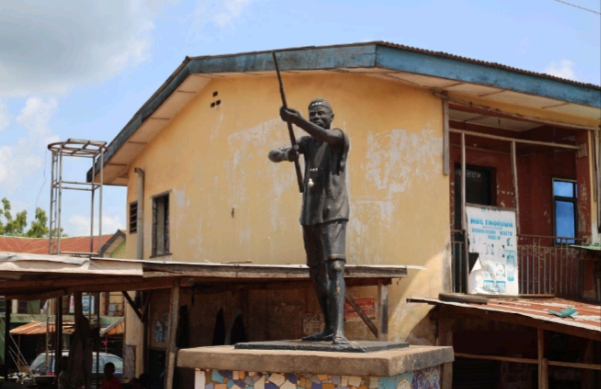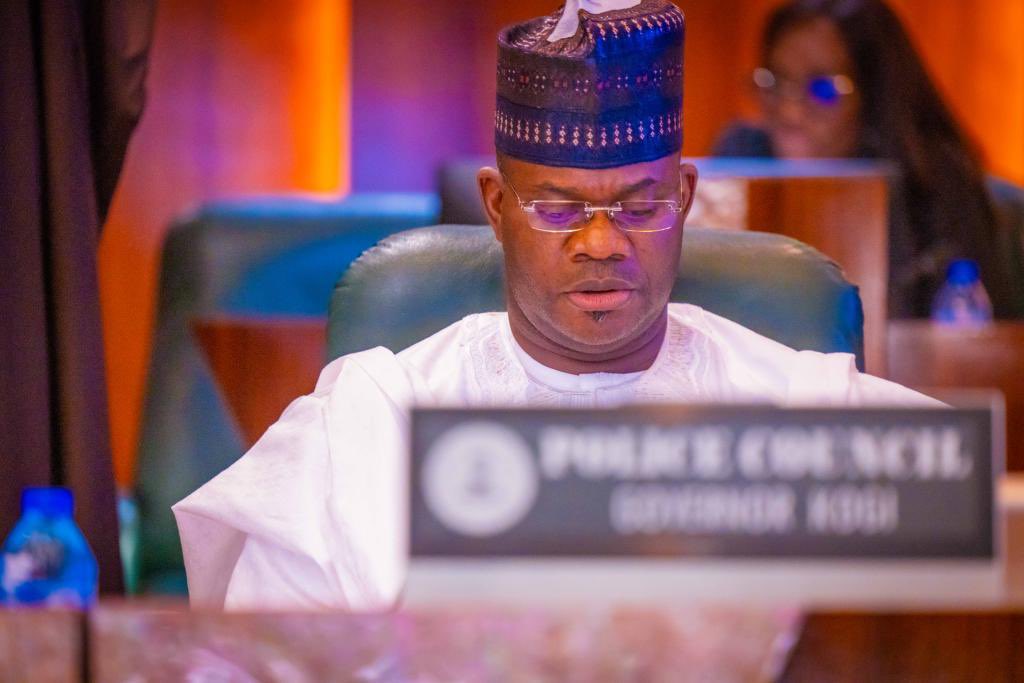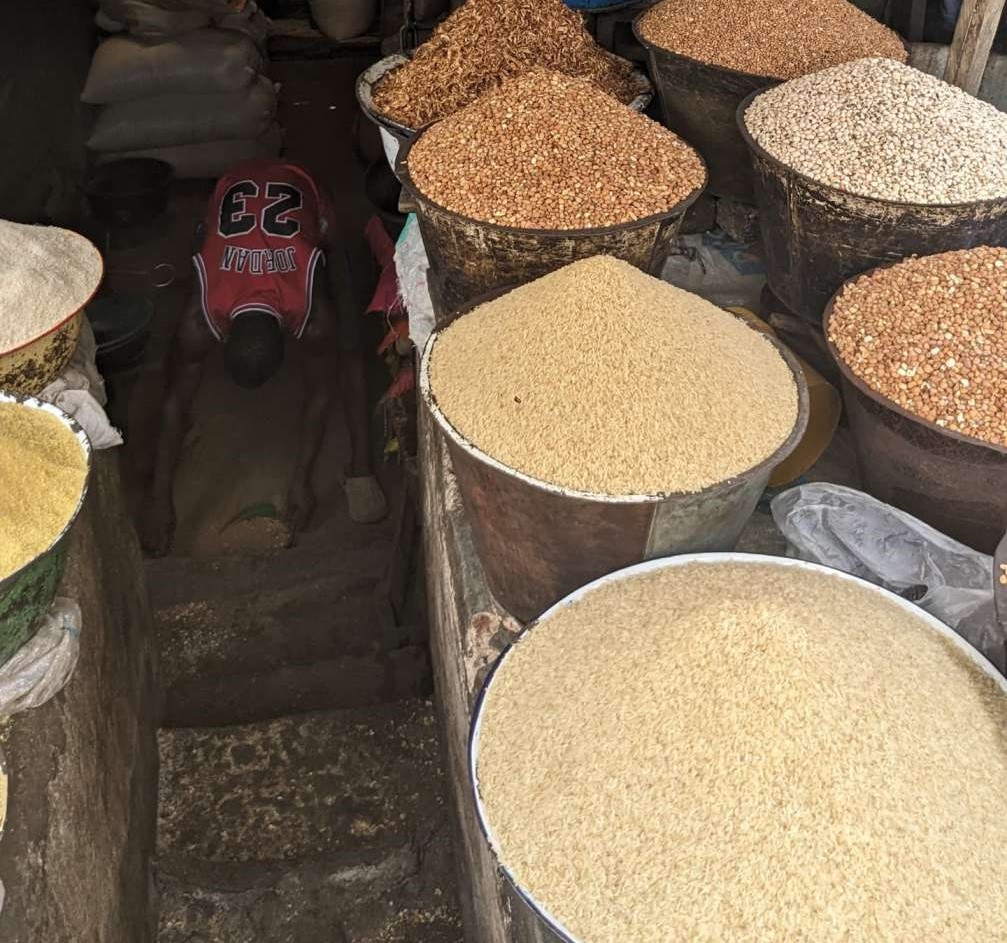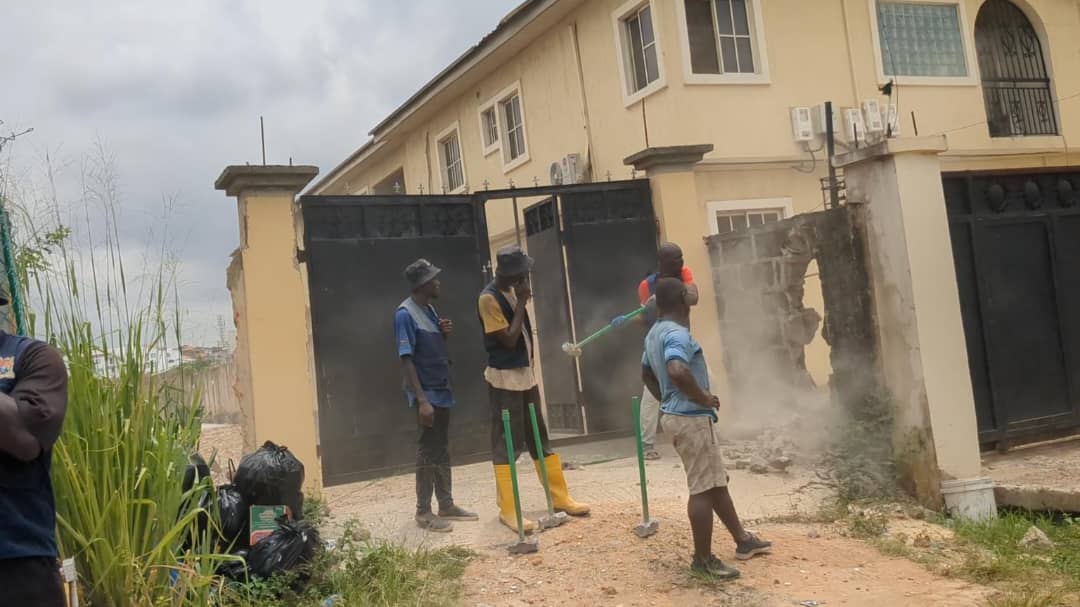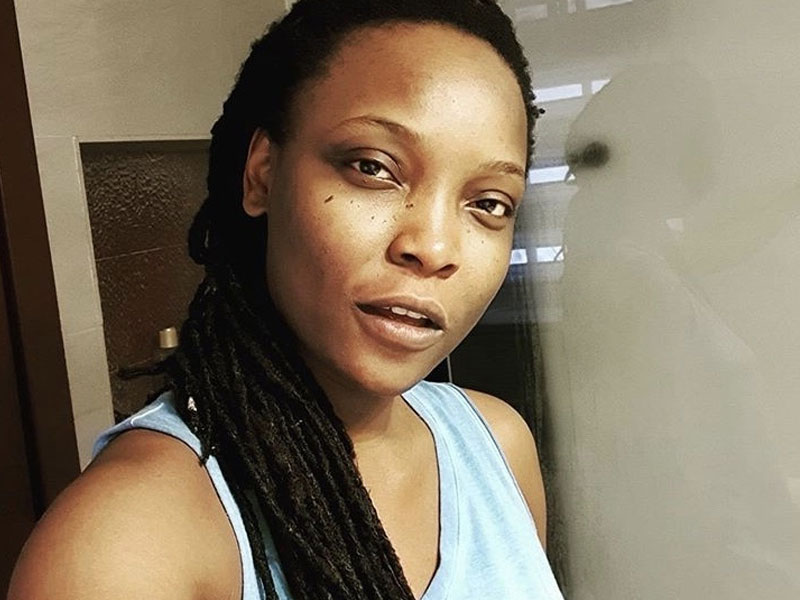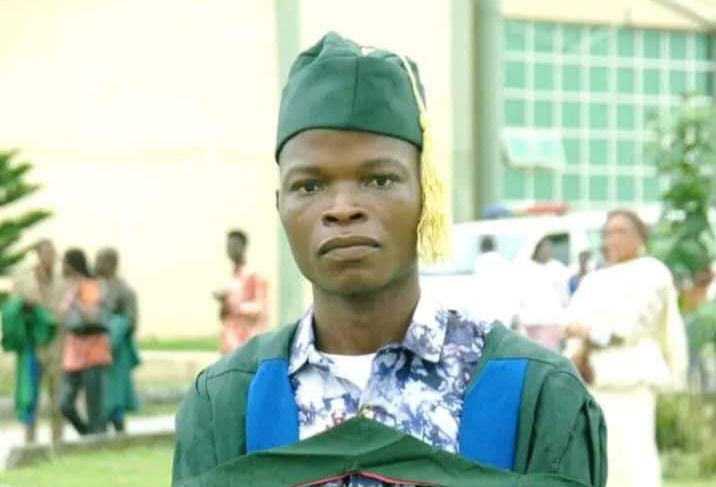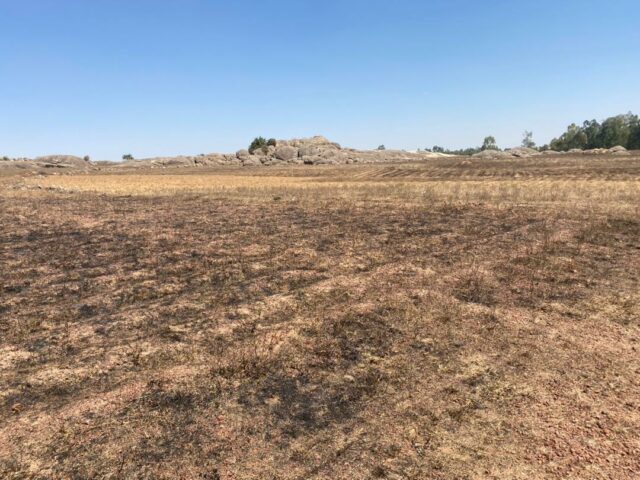In the second part of this series (please read first part here), IBRAHIM ADEYEMI reports that local hunters and vigilantes have taken the place of the Nigerian police in fighting notorious kidnappers in Ondo and Osun under-policed communities. His findings show that local security operatives are dying in their fight against kidnapping but police officers are taking the credit for their relentless efforts.
Wearing a faded jersey, a blank face and tedious dreadlocks, Ahmed Muhammad could have passed for a street thug or a beggar. His chained hands are crossed above his knees. He sits on the bare floor beside his rifle. He poses and giggles every second as photographers and reporters take his shots.
At just 21, Muhammad enjoys learning about the kidnap-for-ransom trade. From Sokoto, 1000 kilometres away, he had travelled down to Osun to join a terror syndicate.
“I live along the highway to entrap my victims,” Muhammad tells reporters at the Osun State Police Headquarters.
His posture suggests confidence as journalists fire him a fusillade of questions.
“My gang members are all Fulani,” he says. “We make a living by kidnapping for ransom.”
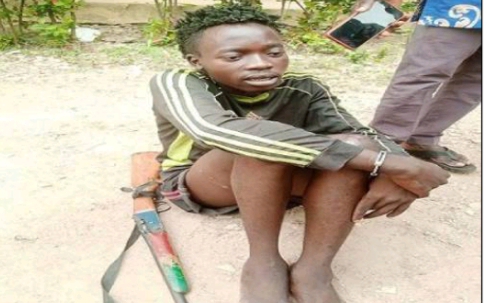
Since joining the criminal band in 2020, Muhammad has learned how to abduct unsuspecting travellers and keep them in the forest to demand millions as ransoms from their relatives. He has also learned how to kill, using local guns.
In April 2021, Muhammad’s kidnap syndicate, led by one Buba, a notorious kidnapper operating in the Ikire area of Osun, abducted two persons travelling from Ibadan to Osun.
When the police learned of the incident, they contacted Nurein Hammed, the leader of the local hunters in the state, to assist them in raiding the forest and rescuing the abductees.
The police paid up to N40,000 to the group of hunters and vigilantes to invade the forest in search of the notorious kidnappers, Hammed says.
“As we arrived at the scene of the abduction, we arrested three Fulani men, who confessed to being informants to the terrorists,” Hammed tells FIJ.
“Later, we saw a vehicle with flat tyres. We would later find out that they were hiding in the forest behind the vehicle to monitor our activities.”
For several hours, the hunters could not trace the kidnappers to their exact location. But at dusk, Nurein says, a farmer was seen running and panting in the forest. He had just escaped abduction by the same gang. The abductors had caught him farming and kept him in their den.
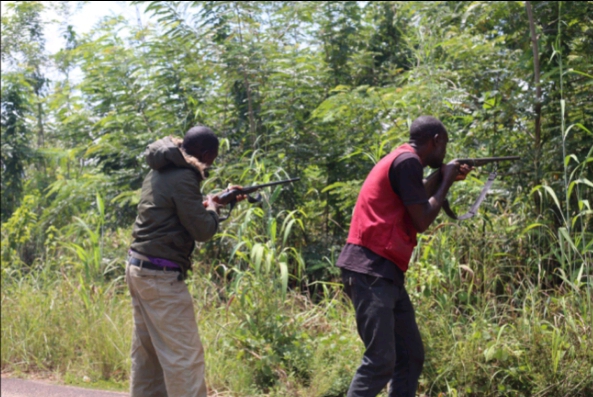
“The man said the kidnappers were thirsty and so, they asked him, being a farmer in the area, to take them to a stream to fetch some water,” Hammed recalls. “The man escaped when they were going to get the water. He would later lead us to their location in the forest after we had consulted the ancestors of the land.”
MAKING A LIVING BY RANSOM
The armed kidnappers took to their heels and disappeared into the thick forest when they saw a contingent of hunters and vigilantes running after them. But one of them, Muhammad, missed his step and fell down.
“One of our hunters shot at him but his bullets did not penetrate, meaning that these people also use charm,” Hammed continues. “We chased him and at one point, we couldn’t find him. So, I came out to meet the leader of the police team to take permission that we would love to set fire in the forest to set the kidnappers off-balance.”
At 2 am, after setting the forest ablaze, the hunters found Muhammad hiding under a baobab tree, his left leg injured. As he saw the hunters, he opened fire on them again but he was eventually nabbed and tied with a rope. Before then, the police had left the scene of the raid while the hunters engaged in a gun duel with the terrorists.
“When the day broke, we handed him over to the police,” Nurein says. “It was at the police station that he told us his superiors taught him how to kidnap and kill using force. He said they planned their abduction strategies in Ibadan.”
In April 2021, the police paraded Muhammad at the Osun State Police Force in Oshogbo, taking the glory for the arrest of the kidnapper. Although the teenage terrorist appears to have met his waterloo, he has no regrets.
“It was easy for them to arrest me because I don’t know the routes in that bush,” he says. “I am here because I could not trace my steps to the place where my other gang members escaped to.”
FIGHTING WITH THEIR LAST DROP OF BLOOD
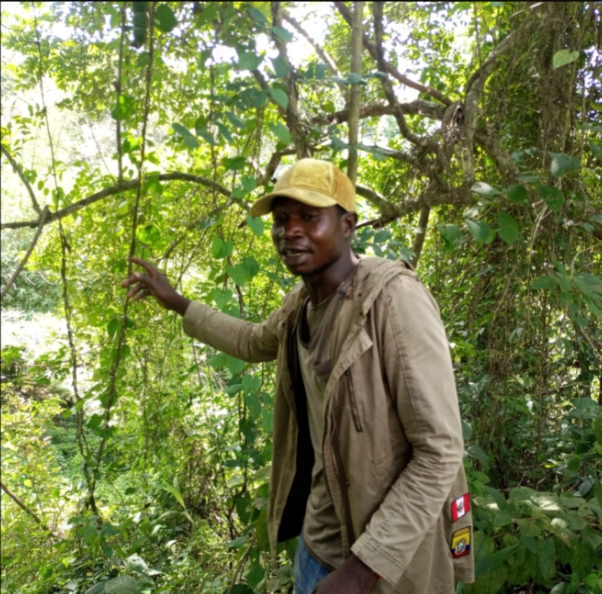
Across Nigeria’s under-policed highways in the southwestern states, kidnappers and other terror groups are taking advantage of the weak policing system to shed the blood of innocent citizens or kidnap them for ransom.
While local warriors like Hammed die fighting kidnappers, police officers take credit for their efforts, FIJ can report. Local hunters interviewed in Osun said they were driven by their passion to defend their ancestral lands.
However, in the course of what they called a “thankless volunteering job”, many of them get harmed or killed by the miscreants. For instance, Habideen Abiodun, 42, a notable hunter and member of the Odua People’s Congress (OPC), died in a gun duel with some armed kidnappers hiding in the hills along the Igbajo road in the state. As the leader of the local vigilantes in the area, he had led the local warriors to dislodge some suspected kidnappers terrorising residents and travellers on the highway.
“Immediately we identified their location in the forest, we exchanged fire with the criminals but they had more sophisticated weapons,” Nurein reveals. “We eventually freed the victims but we lost the man who led the operation. It was really painful.”
Habiddeen was believed to have possessed magical powers to resist bullet penetrations. But his magic failed him while raiding the kidnappers, who shot at him and his squad.
Back home, Habbiddeen’s three wives and nine children say they are left to suffer. Following his sudden death, the state government, led by Governor Ggboyega Oyetola, pledged to provide adequate support to his wives and children but none of the promises was fulfilled.
FROM OSUN TO ONDO
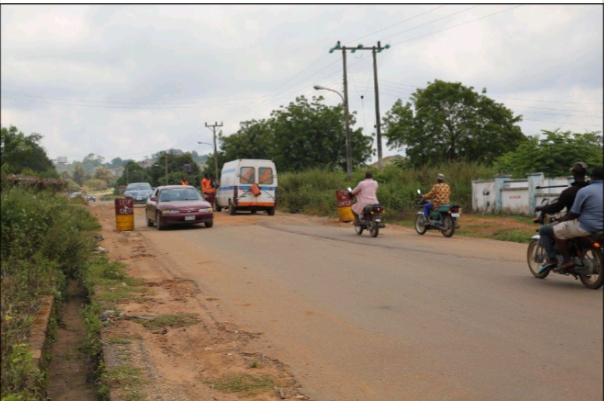
Over 100 kilometres away in Akure, Ondo, killing and kidnapping thrive on the outskirts of the state. In the first leg of this reporting series, experts described Ondo as the kidnap capital of the Southwest. Akoko, a big landscape in the state, is indeed the central point of abduction in the state.
This reporter travelled to the downtown of Akoko, from Akure, to document the plights of citizens disappearing into the hands of notorious kidnappers. For two weeks, we took note of reported kidnapping incidents and how the Nigerian police reacted to complaints of abductions from victims’ relatives.
In the Akoko-Northwest Local Government Area of the state, over 200, 000 residents are at the mercy of kidnappers allegedly infiltrating the communities through the Kogi and Ekiti borders.
In two separate operations in May 2021, two residents of Ibaram-Akoko disappeared in less than 48 hours. In January alone, during our visit, over 10 persons were reported missing, according to local vigilantes interviewed by FIJ.
Residents say the lack of adequate security presence in the area puts them at risk of being kidnapped on the community clay roads.
Residents of this community are at the mercy of kidnappers because the Ibaram-Akoko Police Station has only one unarmed officer who only takes notes of complaints that would not be treated.
ONE STATION, ONE POLICEMAN, NO GUN
When we arrived at the site of the police station in early January, no officer was in sight. The police station serving over 20,000 residents of Ibaram-Aokoko and its neighbouring communities was said to have only one officer identified as Inspector Adeleye.
Residents told FIJ that Adeleye doesn’t have a gun to protect himself, let alone the citizens from attacks. “The only police officer here has gone out,” a middle-aged woman living near the station says. “We’re protected by God.”
A few kilometres away at the Ikaram-Akoko Police Station, the only officer in charge admitted that lack of security personnel has aggravated kidnapping menaces in the area. He would advise victims of kidnapping in the area not to unduly argue with the abductors, especially when huge ransoms are demanded.
ADVICE FROM POLICEMAN: COOPERATE ON RANSOMS
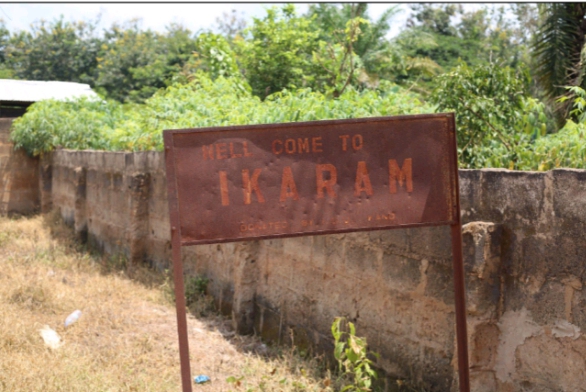
“The only thing I tell people when they come here to lodge complaints is that they should go and look for money to pay the kidnappers,” the officer says.
“It has happened to my cousin-sister, a lawyer. When she was abducted we had to pay regardless of the fact that I’m a police officer.”
Akoko Northwest, the oval earth hosting the under-policed communities, is located in the northeastern part of Ondo and is blessed with hills and savannah vegetation. The present security challenges in the terrain are a fallout of the crisis in the northwest region of the country, according to Andrew Momoh, the chairman of Akoko Northwest Local Council.
“Not all Hausa/Fulani are criminals,” Momoh says. “These people have lived with host communities for ages without any crisis until recently.”
The chairman suggests that the influx of herdsmen from the north contributed to the high rate of kidnap-for-ransom in the area.
“These herdsmen come in to commit different crimes and escape through the forest to Kogi State,” he claims. “With the help of vigilantes, hunters and Amotekun corps, we hope for improvement in security in Akokoland. We call on the Federal Government to do more in order to ensure the security of lives and properties of Nigerians.”
In Akoko and other under-policed areas in Ondo, local security outfits have taken the place of the police. For example, the Ondo State Security Agency Network codenamed ‘Amotekun Corps’ says it foiled 35 kidnappings between May 2020 and September 2021.
Adetunji Adeleye, the state Commander of the Corps, told FIJ the local security operatives have treated over 2000 criminal cases within the same period. He noted that the corps also arrested 1,000 suspects, waded into 515 herders-farmer clashes, and raided kidnappers in their forests.
FIJ’s on-the-ground reporting in many of the communities visited revealed how local hunters generate funds from passing vehicles and individual donations to procure locally-made arms. In Ikaram-Akoko, for example, local hunters manning roadblocks were seen collecting what they called “security fare” from commercial vehicles on the clay roads.
Aremu Isaac, the spokesperson of the local police in the area, says their only means of funding policing in the area is internally generated revenue from members of the community. Isaac, a graduate of Adekunle Ajasin University, Akungba (AAUA), says his only way of giving back to society is by joining the community police.
“I did my final year project on community policing, so I know the importance of what I do,” he tells FIJ. “These hunters have the geography of this land in their head. So it’s easier for them to track the kidnappers to their dens than any police or army officer.”
COMMUNITY POLICING IS THE WAY
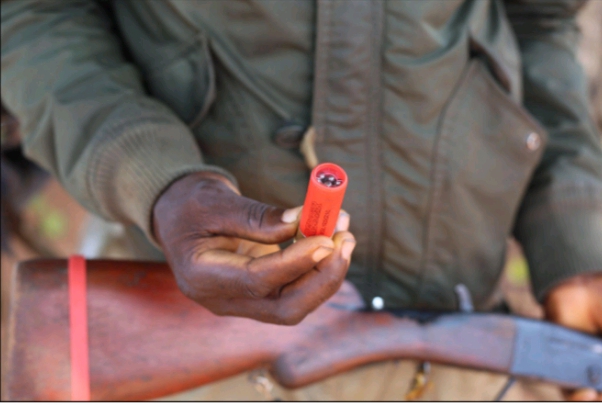
Experts with thorough knowledge of the security situation in the country have asked the state and federal authorities to invest more in community policing.
Community policing, according to security specialists, is about policies and strategies made to control crime and protect lives and properties. Although some experts fear a lack of objectivity and professionalism by the local police operatives, others argue that moderated community policing would solve the overwhelming kidnapping menaces.
“Community policing would ensure the need for greater accountability of police, greater public share in decision making and greater concern for civil rights and liberty,” says Aminu Audu, a security expert in global community policing. “Community policing is about the police, the community coming together to address issues, most especially crime-causing conditions.”
Temitope Olodo, a preventive terrorism consultant, said community policing is the way to go in the face of the current security challenges, adding that all the stakeholders should be ready to take community policing seriously if the system would work.
“Community policing is all about people telling the authorities what their security needs are, and channelling the effort and resources to those areas to tackle them,” he says. “We need practical changes… the type that will make us turn around and say, ‘this is the change we wanted.”
Produced in partnership with the Centre for Democracy and Development (CDD).
Subscribe
Be the first to receive special investigative reports and features in your inbox.


